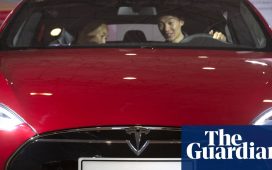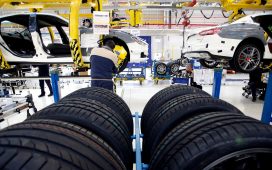A collapse in profits at the carmakers Nissan and worse than expected results at Stellantis, the owner of Citroën, Peugeot and Fiat, have deepened fears of a global downturn in the automotive industry.
Shares in Stellantis, which is listed in Milan, plunged on Thursday after it published disappointing earnings, while its French rival Renault also tumbled on the back of the wider concerns despite reporting record profitability.
Stellantis, a 14-brand group that also includes Alfa Romeo, Chrysler, Dodge and Maserati, said net profit in the first six months of the year had been almost halved to €5.6bn (£4.72bn) for the first half of the year.
Its sales fell 14% to €85bn, and were hit by a downturn in Europe and particularly in North America.
Also on Thursday, Nissan said its operating profit had collapsed 99% to 995m yen (£5.03m) in the three months to 30 June, with worldwide sales flatlining at just under 800,000.
Renault still holds a stake in Nissan, the shares of which plunged more than 10% on Thursday after the company issued a profit warning citing “intense sales competition”, especially in the US.
Makoto Uchida, the chief executive of Nissan, blamed the downturn on its performance in the US, saying it was “unable to boost volumes as expected”, which analysts said was partly down to a change over from the old Rogue SUV-type vehicle to a newer model but also to a softening demand.
Stellantis pledged to take steps to address problems including output and prices. In a statement Carlos Tavares, its chief executive, said: “The company’s performance in the first half of 2024 fell short of our expectations.”
Renault, which earlier this year pledged to bring down the cost of electric vehicles in order to compete with rivals in China, has just signed a deal to build a new low-cost Twingo EV in Slovenia.
Results from the industry were published hours after the Society of Motor Manufacturers and Traders, Britain’s car trade body, said production had slipped 7.6% in both conventional and electric vehicles in the UK in the first half of the year.
It said the industry produced more than 416,000 vehicles, about 35,000 fewer than the first half of 2023. Mike Hawes, the body’s chief executive, said it was partly down to the transition to the production of electric vehicles as factories repurpose.
He called on the government to halve VAT on new battery electric vehicles and scrap an extra levy on luxury cars costing more than £40,000 that the SMMT says hits about 70% of EV trade.
after newsletter promotion
Adding a “carrot” to the market could boost uptake of EVs by 250,000 over three years with experience around the world showing consumers do not respond to “sticks”, Hawes said.
The sector is expected to hit bumps in the road ahead as consumers transition from conventional combustion engines to EVs, with affordability and battery anxiety still considered the main barriers to purchase.
The Chinese are considered to have a 10-year head start on European and US rivals on the changeover, thanks to an industrial strategy that has enabled the country to build a globally dominant position on the production of lithium hydroxide, one of the most essential and expensive elements in car batteries.
The EU recently slapped provisional tariffs on Chinese imports, with Brussels determined to protect the bloc’s auto industry, arguing they had benefited from state subsidies and a range of supports ranging from free land for factories to financial support for shipping to European ports.
Agence France-Presse contributed to this report










